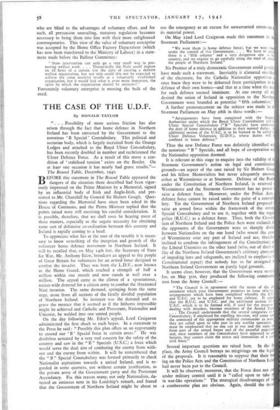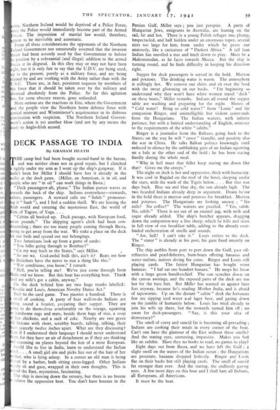THE CASE OF THE U.D.F.
By DONALD TAYLOR
. . . Possibility of more serious friction has also arisen through the fact that home defence in Northern Ireland has been entrusted by the Government to the notorious `B Special' Constabulary. This political and sectarian body, which is largely recruited from the Orange Lodges and attached to the Royal Ulster Constabulary, has been recently doubled in number and rechristened the Ulster Defence Force. As a result of this move a con- dition of ' stabilised tension ' exists on the Border. On at least one occasion it has nearly had grave results."— The Round Table, December, 1940.
BEFORE this statement in The Round Table appeared the dangers of the situation there described had been vigor- ously impressed on the Prime Minister by a Memorial, signed by an influential body of Irish and Anglo-Irish, and pre- sented to Mr. Churchill by General Sir Hubert Gough. Ques- tions regarding the Memorial have since been asked in the House of Commons, and the Prime Minister replied that the points raised were still receiving his careful consideration. It is possible, therefore, that we shall soon be hearing more of these matters, especially as the urgent necessity for obtaining some sort of defensive co-ordination between this country and Ireland is rapidly coming to a head.
To appreciate what lies at the root of the trouble it is neces- sary to know something of the inception and growth of the volunteer home defence movement in Northern Ireland. It will be recalled that, on May 14th last, the Secretary of State for War, Mr. Anthony Eden, broadcast an appeal to the people of Great Britain for volunteers for an armed force designed to combat the invader. Thus was born the L.D.V., now known as the Home Guard, which reached a strength of half a million within one month and now stands at well over a million. The appeal came as the climax of a spontaneous, nation-wide demand for a citizen army to combat the threatened Nazi invasion. The same demand, springing from the same urge, arose from all sections of the fatally divided population of Northern Ireland. So insistent was the demand and so grave the menace that it seemed as if the hitherto impossible might be achieved and Catholic and Protestant, Nationalist and Unionist, be welded into one united people.
On the day following Mr. Eden's appeal, Lord Craigavon administered the first shock to such hopes. In a statement to the Press he said: " Possibly this plan offers us an opportunity to extend our ' B' Special force in certain areas." He was doubtless actuated by a very real concern for the safety of the country and saw in the " B " Specials (U.S.C.) a force which would serve the dual aim of combating the enemy from with- out and the enemy from within. It will be remembered that the " B " Special Constabulary was formed primarily to check Nationalist aspirations towards a united Ireland, and is re- garded in some quarters, not without certain justification, as the private army of the Government party and the Protestant Ascendancy. Fos this reason many, not only Nationalists, de- tected an ominous note in his Lordship's remark, and feared that the Government of Northern Ireland might be about to use the emergency as an excuse for unwarranted extension its material power.
On May 22nd Lord Craigavon made this statement in Stormont Parliament " We want them (a home defence force), but we want t under the control of this Government.. . . We have to rea there is a `fifth column' and a very dangerous one in country, and we require to go carefully along the road of • the people of Northern Ireland."
No Premier of a truly democratic Government could possiii have made such a statement. Inevitably it alienated one- of the electorate, for the Catholic Nationalist opposition once knew they were to be debarred from participation in defence of their own homes—and that at a time when the ne for such defence seemed imminent. At one sweep all w desired the union of Ireland in opposition to the North Government were branded as potential " fifth columnists."
A further pronouncement on the subject was made in Stormont Parliament on May 28th in these words:— " Arrangements have been completed with the Imper Authorities under which the Royal Ulster Constabulary and Ulster Special Constabulary (" B " Specials) have undert the duty of home defence in addition to their normal duties. additional section of the U.S.C. is to be formed to be called Ulster Defence Volunteers (U.D.V.), whose duties will confined to home defence."
Thus the new Defence Force was definitely identified wi the notorious " B " Specials, and all hope of co-operation wi the Nationalist opposition doomed.
It is relevant at this stage to enquire into the validity of Stormont Government's action on legal and constituti grounds—an aspect of the case raised by Sir Hubert Gou and his fellow Memorialists but never adequately answe either at Westminster or at Stormont. Defence of the Re under the Constitution of Northern Ireland, is reserved Westminster and the Stormont Government has no power raise a defence force. Moreover, under the Police Acts. defence force cannot be raised under the guise of a consta lary. Yet the Government of Northern Ireland proposed raise an armed force within the framework of the exis Special Constabulary and to use it, together with the reg police (R.U.C.) as a defence force. Thus, both the Const tion of Northern Ireland and the Police Acts were violated, the opponents of the Government were so sharply divid between Nationalists on the one hand (who resent the po of Westminster over any part of Ireland and are, therefo inclined to condone the infringement of the Constitution) a the Liberal Unionists on the other hand (who, out of their like of the Northern Ireland Government's arbitrary abrogan of impeding laws and safeguards, are inclined to emphasise Constitutional aspect) that nobody has so far arraigned Northern Ireland Government on purely legal grounds.
It seems clear, however, that the Government were worn for, on May 31st, they produced the following commun tion from the Army Council:— " The Council is in agreement with the terms of the d statement which your Government proposes to issue relative arrangements which have been completed whereby the KU and U.S.C. are to be employed for home defence. It ap that the R.U.C. and U.S.C. and the additional section of U.S.C. .which is to be formed will, if used for the purpose dealing with invaders, become members of the Armed Fo . . . The Council understands that the several categories of Constabulary, if employed for repelling invasion, will come us the command of the appropriate military commander as soon they are called upon to take part in any warlike operation. must be emphasised that no one can at one and the same form part of the armed forces and of the peaceful popul and, once members of the Constabulary have appeared as batants, they cannot claim the status and immunities of a p civil force."
Several important questions are raised here. In the place, the Army Council betrays no misgivings on the leg of the proposals. It is reasonable to suppose that their ing on the Police Acts and the Constitution of Northern Ire had never been put to the Council.
It will be observed, moreover, that the Force does not c under military control until it is " called upon to take in war-like operations." The strategical disadvantages of • a cumbersome plan are obvious. Again, should the inv
• 1
e
me, Northern Ireland would be deprived of a Police Force, e the Police would immediately become part of the Armed ices. The imposition of martial law would, therefore, p ear to be inevitable and automatic. From all these considerations the opponents of the Northern and Government not unnaturally assumed that the invasion eat bad been astutely used by that Government to bolster is position by a substantial (and illegal) addition to the armed or es at its disposal. In this they may or may not have been ight, but it is only fair to say that the U.D.V. are being used, p to the present., purely as a military force, and are being ained by and are working with the Army rather than with the .S.C. There are, in fact, persistent requests by members of e force that it should be taken over by the military and ivorced absolutely from the Police. So far this agitation as, for some obscure reason, gone unheeded.
ore serious are the reactions in Eire, where the Government d the people view the Northern home defence force with meal mistrust and Westminster's acquiescence in its dubious on titution with suspicion. The Northern Ireland Govern- ear's action is yet another blow (and not by any means the ast) to Anglo-Irish accord. in
0































 Previous page
Previous page